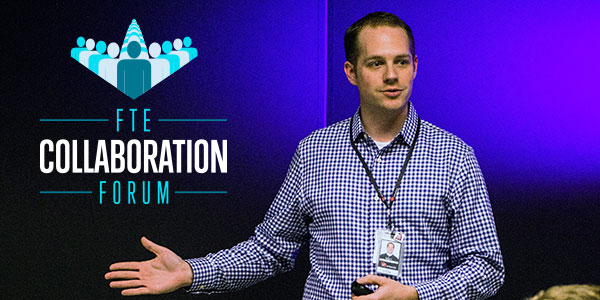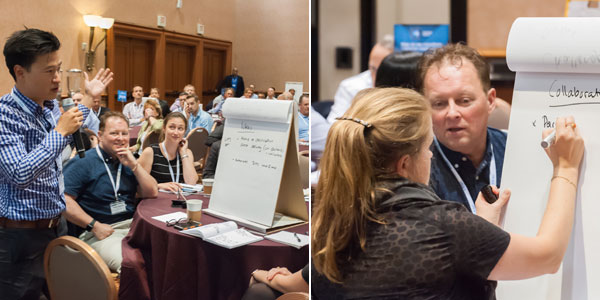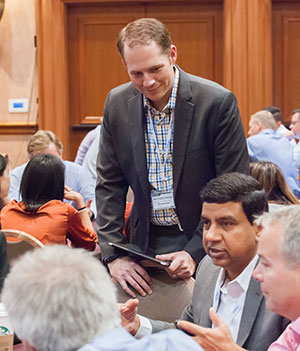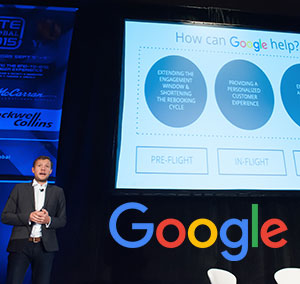
Our goal is for FTE to be an industry change catalyst and we are making more efforts to facilitate actual industry collaboration at our shows, as opposed to just discussing the need for it, which is why we have introduced the FTE Collaboration Forums. The first of these took place at the 10th FTE Global show in Las Vegas last month, receiving fantastic feedback and creating great output. The sessions provided a discussion platform for various stakeholders to discuss how they can collaborate in key areas to enhance the end-to-end passenger experience. Delegates chose which topic they would like to discuss, and then joined the relevant table to exchange thoughts, ideas, frustrations and potential ways forward.
There were three key groups in different working zones, each with their own captain who helped brief and guide the 11 working groups with their discussions on each table. Each delegate played an important role in forming ideas and conclusions within their sub-group, before the most pertinent issues and findings from their discussions at each table were shared collectively.
The Session Chairman was Kiran Merchant, CEO, DY Consultants & Chairman of Airport Terminal of the Future. David Bourgon, Manager, Airport IT Services, Manager, Airline Systems, McCarran International Airport, led our “On the Ground” discussions; Rodrigo Llaguno, Vice President – Customer Experience, Avianca, led our “Up in the Air” discussions; and Matthew Streem, Vice President, Senior Vice President of Product, Roomstorm (and formerly of Virgin America and American Airlines) led “data sharing” discussions, which were triggered by working groups finding ways forward on a number of disruption scenarios.

Conclusions from “data sharing” discussions led by Matthew Streem, Vice President, Senior Vice President of Product, Roomstorm (and formerly of Virgin America and American Airlines)
Today we share Matthew’s grand conclusions that take into account all the comments, ideas and suggested ways forward from all the different working groups he was liaising with:

As the global airline industry begins to enter the world of big data, it can no longer afford to maintain its current level of insulation against data sharing with third parties. Unfortunately though, this same hesitation has been shared by the airlines’ business partners as well. If the industry is going to provide the best service possible to the end passenger, a collaborative environment must be created where all portions of a guest’s journey can be amalgamated, regardless of the originating service provider.
Building a technology platform that all stakeholders (airlines, hotels, rental cars, etc.) can connect to and contribute to is needed to enable seamless service. Today, the passenger is expected to notify their hotel if their flight is cancelled. Why can’t that be automated? A standardised industry XML language would begin to further this goal. IATA must partner with its equivalent organisations in other sectors of the travel industry to develop industry-wide standards, not just rules for airlines. Other firms in the travel space must be appropriately incentivised to share this data. That can come through standards enacted by regulatory bodies, or through financial incentives. Financial incentives will ultimately depend on who is the holder of the data. If passenger data is to be warehoused by a central body, the industry recommends that body be a non-profit organisation. This will reduce the tendency for other data companies to hesitate to do business with them. Having a Google or Expedia be the central data repository will immediately result in the other not being willing to participate. A lack of participation destroys the entire initiative. However, a central database is not necessarily required for this data sharing to be possible. If airlines and other partners in the travel industry can collaborate with each other to share this data openly, then there is no reason they cannot connect directly to each other and have a “global PNR” that covers all portions of a passenger’s journey and is accessible to all.
While there is likely some hesitation to share this level of data, and potentially competitive information, there are ways to accomplish this without giving up key customer information. The industry is recommending the use of an anonymous token that links various reservations to each other. For example, an OTA may not want to share customer contact information with an airline because they would be giving up their customer, but if the flight is cancelled the airline has no way to reach out to the passenger. In this situation, the OTA could generate an anonymous token that is passed to the airline and serves as the verification of passenger identity. The airline would not need the passenger’s phone number, but rather could trigger a flight alert based on that token and have the actual notification generated through the OTA’s servers.
While many other suggestions came up during the forum, most of them were in this area of data sharing and technology standards. The group strongly recommends a standard exist not just for airlines, but throughout the travel industry. Ultimately, it is the passenger who suffers if we are not able to achieve these goals.
As a closing note, FTE would like to thank all our captains and say we were particularly pleased to see that on the day so many delegates chose to participate in the working groups around data sharing. We have heard this described by one airline executive as the “dark side of our business” that many resist in engaging on, despite the fact that progress in this area would offer huge operational benefits and transform customer experiences, particularly in times of disruption, when passengers need the most support.
We are seeing some great examples recently of data sharing from the likes of easyJet and Gatwick and Aer Lingus and DAA and we hope it is just the beginning of a major new trend, and that IATA will take the lead on setting the industry standard needed across the travel industry that could revolutionise the travel experience of the future.
Conclusions from our other FTE Collaboration Forums will be shared in the weeks to come.
Google to lead FTE Asia Collaboration Forums in Singapore this Nov 17-19th
We are delighted to announce that Max Coppin, Partner Development Manager, Google will play the role of Session Chairman for the FTE Collaboration Forum Asia. He will set the scene for the session and lead the discussions to help bring new ideas, and outside of the industry thinking, to the brainstorming that follows.
As with FTE Global, there will be working groups in different working zones, each with their own captain who will brief and help guide the working groups with their discussions on each table. At the start of the session, each delegate will join one of the working groups. They will then play an important role in forming ideas and conclusions within that sub-group that will be shared with their fellow delegates through the post-event website.
 Innovation groups:
Innovation groups:
- Advanced airport self-service
- Baggage advancements
- Airport terminal design
- Data sharing
- IFE
- Cabin connectivity
- Cabin design
- Crew empowerment
Supporting Team Captains will be announced soon.







